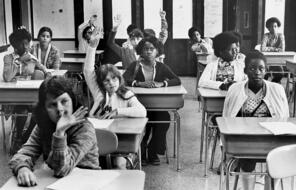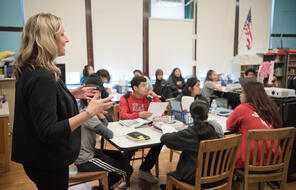Report on the Exclusion of Latinx Children from Schools
At a Glance
Subject
- Civics & Citizenship
- Social Studies
- Democracy & Civic Engagement
- Human & Civil Rights
- Racism
The following is an excerpt from a report published in 1970 on children who were excluded or ignored by the Boston Public Schools:
[W]e can state with a marked degree of confidence and alarm that between 2,650 and 7,800 Spanish-speaking children of school age in Boston are not in school. . . . [T]hese thousands of children are out of school because there are no educational programs for them. The school system does not recognize that their needs must be reflected in the school curriculum. . . .
This problem is seen not only by community leaders, but is recognized by certain school officials as well. Reporting to the federal government, the Boston School Department stated:
“The Spanish-speaking child finds himself in a classroom where the total curricula, methods, and medium of language are geared toward the native English speaker . . . It is unrealistic for us to suppose that if we then place a number of non-English speakers in this urban classroom, the teachers can meet the special needs of these children.
At present the children within these areas are unable to cope with the subject content being taught because of their lack of proficiency in English, and almost immediately encounter failure in the classroom. For many this failure pattern continues for a number of years until the child has gained the needed proficiency in English. By this time the initiative and positive self-image (so necessary for success in any educational endeavor) of many of these children has been thoroughly thwarted.”
Thus, the major reason most of these children are out of school becomes clear. The educational programs, by the School Department’s own admission, are failing to educate the numbers of Spanish-speaking children who are in school. The people in the Spanish-speaking community—leaders and parents—know that the school system is failing to educate their children. Because there are no adequate programs for them, there is little alternative but to allow their children to remain out of school . . .
The most important aspect of this entire problem is how it affects the children themselves: what does it mean to a child when he can’t go to school? What effect does it have upon his life?
The Spanish-speaking child does not have to know English to realize that other children go to school. He sees them pass his house each day. But he can’t go; there is nothing at school for him . . .
The child, in a huge, new country, is told to change his language, habits, and customs—his very being. He is forced to deny what he is, finding that his own self is not “proper” or not of value. And it is this message that the child has reinforced in his mind each day the school doors open for other children, but not for him. 1
- 1“The Way We Go to School: The Exclusion of Children in Boston,” report by the Task Force on Children Out of School (US Department of Health, Education & Welfare, Office of Education, 1970), 18–20.













